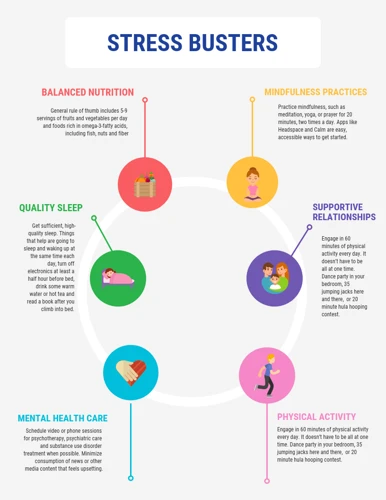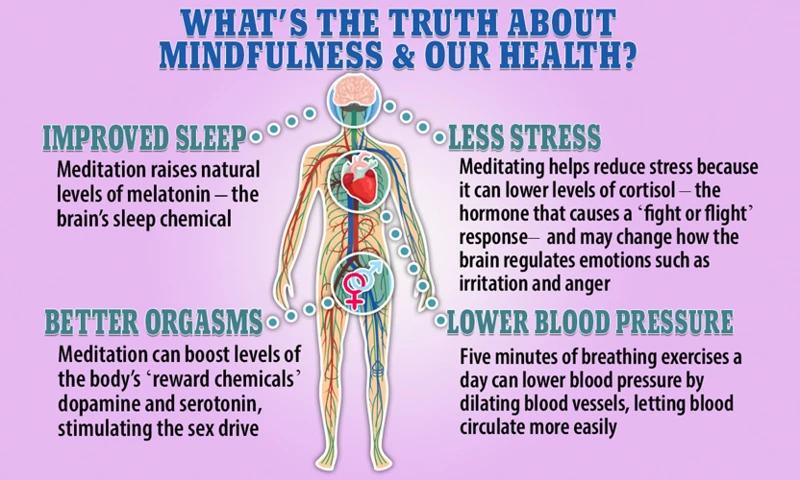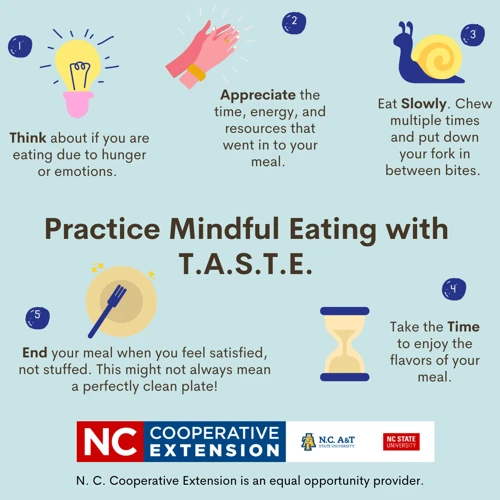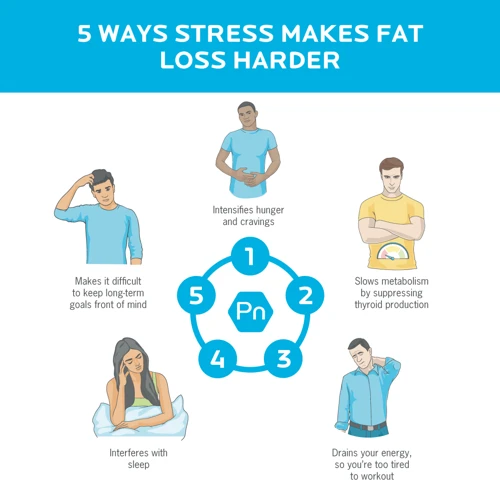Have you ever found yourself reaching for another slice of pizza or a bag of chips after a stressful day at work? Do you feel like your stress levels are holding you back from achieving your weight loss goals? It’s a frustrating experience that many of us can relate to. The truth is, stress and weight gain are closely linked, and it’s not just about emotional eating. Stress hormones like cortisol play a significant role in weight gain, making it harder to shed those pounds. But what if I told you that there is a way to manage stress and lose weight at the same time? That’s where mindfulness comes in. In this article, we’ll explore the role of mindfulness in stress reduction and weight loss, its scientific backing, tips to incorporate it into your daily life, and how to overcome challenges that may arise along the way.
The Connection between Stress and Cravings

Stress can have a powerful effect on our bodies and minds, and one of the ways it can impact us is through cravings for unhealthy foods. Many people turn to comfort foods when feeling stressed, leading to a cycle of overeating and weight gain. It can be difficult to break this cycle, but understanding the connection between stress and cravings is an important step towards finding solutions. Let’s explore how stress leads to overeating and the role of cortisol in weight gain.
How Stress Leads to Overeating
Stress can lead to overeating in several ways:
- Emotional Eating: Stress can trigger emotional eating as people tend to use food to cope with their negative emotions. They look for the pleasure they get from eating comfort foods instead of seeking a healthy solution to alleviate their stress.
- Cravings: Stress can induce intense cravings for sugary, salty, and fatty foods. This is because the stress hormone cortisol increases the level of glucose in the blood, leading to a spike in insulin, which triggers hunger and leads to overeating.
- Lack of sleep: Stress can also disrupt sleep patterns, leading to fatigue and a lack of energy. This can cause people to turn to high-calorie foods to boost their energy levels and manage their stress.
- Decreased metabolism: When stressed, the body produces cortisol, which can decrease metabolism, leading to weight gain and overeating.
It is important to note that stress affects everyone differently and some people may not experience overeating as a response to stress. Nevertheless, recognizing the link between stress and overeating is vital when it comes to managing weight and promoting a healthy, balanced lifestyle.
The Role of Cortisol in Weight Gain
Cortisol is a hormone which is naturally produced in the body in response to stress. This hormone is also known as the “stress hormone” because it is released during times of physical or emotional stress. While cortisol serves an essential function in maintaining the body’s homeostasis, long-term activation of this stress response can contribute to weight gain.
Here are some ways in which cortisol affects weight gain:
- Appetite regulation: Cortisol can interfere with appetite regulation by altering levels of hormones like leptin, which signals fullness, and ghrelin, which signals hunger. This can lead to overeating and weight gain.
- Metabolism: Prolonged periods of elevated cortisol levels can lower the body’s metabolism, causing fewer calories to be burned and resulting in weight gain.
- Increased fat storage: Cortisol can also promote the storage of fat, particularly in the abdominal area, which can contribute to obesity and other health problems.
While cortisol may not directly cause weight gain, its impact on appetite, metabolism, and fat storage can make it more challenging to lose weight. Addressing stress and cortisol levels through practices like mindfulness and stress reduction can be beneficial for weight loss efforts.
What is Mindfulness

Mindfulness is a buzzword in the world of stress management and weight loss, but what exactly does it mean? Essentially, mindfulness is the practice of being present and aware in the moment, without judgment or distractions. It involves paying attention to one’s thoughts, feelings, and bodily sensations, as well as the environment around them. This type of awareness can be applied to many aspects of life, including eating habits, exercise routines, and stress reduction techniques. By incorporating mindfulness into daily habits, individuals can experience a greater sense of well-being and improved weight management. In this section, we’ll delve deeper into the basics of mindfulness meditation and the benefits of mindful eating.
The Basics of Mindfulness Meditation
To understand how mindfulness meditation can be beneficial for weight loss and stress reduction, it is important to first understand the basics of this practice. Mindfulness meditation is a type of meditation that involves focusing on the present moment, without judgment or distraction. This can be done in a variety of ways, but typically involves sitting in a quiet space and focusing on sensations in the body, such as the breath or the feeling of the feet on the ground.
One of the key components of mindfulness meditation is the practice of bringing attention back to the present moment when the mind wanders. This can be done by noticing when the mind has become distracted, acknowledging the distraction without judgement, and then gently redirecting the focus back to the present moment.
Another important aspect of mindfulness meditation is cultivating a sense of curiosity and openness to the present moment. This means allowing thoughts, sensations, and emotions to come and go without trying to control or judge them.
| Benefits of Mindfulness Meditation |
|---|
| Reduced stress and anxiety: By focusing on the present moment and practicing non-judgment, mindfulness meditation can help reduce stress and anxiety levels. |
| Better focus and concentration: Regular mindfulness meditation practice can help improve focus and concentration, making it easier to stay on track with weight loss goals. |
| Better sleep: Mindfulness meditation can also help improve sleep quality and quantity, which is important for overall health and weight management. |
| Reduced emotional eating: By cultivating awareness and non-judgment, mindfulness meditation can help reduce emotional eating behaviors. |
Incorporating mindfulness meditation into a weight loss plan can be as simple as setting aside a few minutes each day to sit quietly and focus on the breath. Over time, this practice can become a habit that helps reduce stress, improve focus, and promote overall health and wellbeing.
The Benefits of Mindful Eating
Mindful Eating is a practice that allows individuals to become more aware and intentional of their eating habits. By paying close attention to the sensations, thoughts, and feelings that arise during meal times, individuals can develop a healthier relationship with food and improve their overall well-being. Some of the benefits of practicing Mindful Eating include:
- Reduced Overeating: By staying present during meals and paying attention to one’s hunger and fullness cues, mindful eaters are less likely to overeat and consume unnecessary calories.
- Improved Digestion: Mindful Eating encourages individuals to eat slower and chew their food thoroughly, which promotes better digestion and nutrient absorption.
- Decreased Stress: Eating mindfully can help reduce stress and anxiety around food, as individuals become more in-tune with their bodies and less likely to use food as a coping mechanism.
- Increased Satisfaction: When individuals eat mindfully, they can fully enjoy their meals and savor the flavors and textures, leading to a greater sense of satisfaction and fulfillment.
- Improved Relationship with Food: Practicing Mindful Eating can help individuals develop a healthier relationship with food, as they learn to view it as nourishment rather than a source of guilt or shame.
Incorporating Mindful Eating techniques into one’s daily routine can take practice and patience, but can have significant positive impacts on overall health and well-being.
The Science Behind Mindfulness and Weight Loss

As we continue to search for effective ways to manage our weight and reduce stress, we can’t ignore the growing body of research on mindfulness. Studies have shown the potential benefits of incorporating mindfulness into our weight loss journey, from reducing stress hormones to curbing food cravings. But how exactly does mindfulness work to support weight loss? Let’s explore the science behind this powerful practice.
The Impact of Mindfulness on Stress Hormones
Stress is a major contributor to weight gain, and it can be difficult to control. However, mindfulness has been shown to help decrease stress and its impact on the body. When we experience stress, our body releases the hormone cortisol, which can cause weight gain and cravings for high-calorie, high-sugar foods.
In a study published in the Journal of Obesity, researchers found that incorporating mindfulness into a weight loss program reduced cortisol levels in participants. This reduction in cortisol levels led to less stress and improved weight loss outcomes.
Another study found that mindfulness meditation can reduce cortisol levels even in individuals with high levels of chronic stress. The study involved nurses, who are known to experience high levels of stress. After participating in an 8-week mindfulness meditation program, the nurses’ cortisol levels were significantly reduced.
Mindfulness can also help regulate other stress hormones, such as adrenaline and norepinephrine. By reducing the impact of stress hormones, mindful practices can help improve overall physical and mental health. Decreased stress levels can lead to better sleep and more energy for physical activity, both of which are important for weight loss.
Overall, mindfulness can have a significant impact on stress hormones and help reduce the negative effects of stress on the body, including weight gain and food cravings. By incorporating mindful practices into a weight loss plan, individuals can experience improved outcomes and better overall health.
| Benefits of Mindfulness on Stress Hormones: |
|---|
| – Reduced cortisol levels |
| – Improved weight loss outcomes |
| – Decreased impact of stress hormones such as adrenaline and norepinephrine |
| – Improved physical and mental health |
| – Better sleep quality and more energy for physical activity |
Mindfulness and Food Cravings
Food cravings can be a major obstacle to weight loss goals, and in many cases, they are linked to stress. However, practicing mindfulness can be a useful tool for reducing the impact of food cravings on your weight loss efforts. Studies have shown that mindfulness meditation can help reduce cravings for unhealthy foods and lower the likelihood of snacking on high-calorie, sugary treats.
One reason mindfulness can help reduce food cravings is that it can help you become more aware of your body’s signals and needs. By tuning in to your body’s hunger and fullness cues, you may be able to identify when you are truly hungry versus when you are simply craving a particular food out of stress or habit. This awareness can make it easier to resist temptation and make healthier food choices.
Another way mindfulness can help reduce food cravings is by increasing your ability to tolerate discomfort. When you experience a craving, it can be uncomfortable and even painful, but mindfulness meditation can help you learn to sit with the discomfort and observe it without judgment. Over time, this can help you become more resilient to cravings and reduce their impact on your diet.
Here are some additional tips for using mindfulness to reduce food cravings:
| Technique | Description |
|---|---|
| Body scan meditation | Focus on each part of your body, noticing any sensations or feelings without judgment. This can help you become more aware of the physical sensations in your body, including hunger and fullness cues. |
| Craving meditation | When a craving arises, sit with it for a few minutes and observe it without judgment. Notice any physical sensations, thoughts, or emotions that arise, and simply sit with them. Over time, this can help reduce the intensity of cravings. |
| Chew mindfully | Practice eating slowly and mindfully, noticing the taste, texture, and sensations of each bite. This can help you become more aware of the satisfaction you get from food and make it easier to stop eating when you’re full. |
Incorporating mindfulness into your weight loss plan can be a powerful tool for reducing food cravings and making healthier choices. Practice mindfulness regularly and experiment with different techniques to find what works best for you. Remember to approach your practice with curiosity, openness, and non-judgment to get the most benefit.
Mindfulness and Emotional Eating
When we are stressed or overwhelmed, it can be easy to turn to food as a form of comfort. Emotional eating is the act of consuming food as a way to deal with negative emotions or feelings. It is a common problem that many people face, and it can be a significant obstacle to weight loss.
Mindfulness can help with emotional eating by:
- Increasing awareness of emotions: Mindfulness encourages us to pay attention to our thoughts and feelings without judgment. By doing so, we can begin to recognize patterns in our emotional responses to food and develop a greater awareness of why we are eating.
- Breaking the automatic response: When we are in a state of emotional eating, we often reach for the same types of foods out of habit. By practicing mindfulness, we can become more aware of these automatic responses and begin to break the cycle.
- Developing self-compassion: Mindfulness emphasizes the importance of self-compassion and self-care. Rather than beating ourselves up for emotional eating, we can learn to approach ourselves with kindness and understanding.
It’s essential to note that mindfulness is not a quick fix for emotional eating. Like any habit, it takes practice and discipline to develop new patterns of behavior. However, with time and persistence, mindfulness can be an effective tool for managing emotional eating and achieving lasting weight loss.
Incorporating Mindfulness into Your Weight Loss Plan

As we have learned, mindfulness can play a key role in reducing stress and aiding in weight loss. By incorporating mindfulness practices into your weight loss plan, you may find that you are more aware of your body’s hunger and fullness cues, better able to manage cravings and emotional eating, and more motivated to engage in regular exercise. In this section, we’ll explore some practical ways to integrate mindfulness into your weight loss journey, from mindful eating to stress-reducing techniques.
Mindful Eating Tips
One of the key aspects of practicing mindfulness is learning to eat with intention and attention. Here are some mindful eating tips that can assist in weight loss and stress reduction:
- Slow Down: Take time to savor and appreciate each bite. Chew slowly and mindfully, and put down utensils between bites. This allows your body to recognize when it is full, reducing the amount of food you consume.
- Eat Without Distractions: Turn off the TV, put away your phone, and eliminate any other distractions during meal times. This allows you to fully focus on your food and your body’s hunger and fullness cues.
- Engage Your Senses: Take a moment to fully experience the look, smell, texture, and taste of your food. This can lead to a greater appreciation and enjoyment of the eating experience.
- Listen to Your Body: Tune in to your body’s signals of hunger and fullness. Eat when you are hungry and stop when you are satisfied, not when you are uncomfortably full.
- Avoid Emotional Eating: Mindful eating encourages non-judgmental observation of cravings and emotional triggers, rather than giving into them. Take a moment to assess why you are reaching for food and find alternative ways to cope with stress, boredom, or other emotions.
- Portion Control: Pay attention to serving sizes and use tools like measuring cups or food scales if needed. This helps prevent overeating and promotes a healthy relationship with food.
- Gratitude: Take a moment to express gratitude for your food, the farmers who grew it, and those who brought it to your table. This can help cultivate a more positive relationship with food and lessen negative associations.
By incorporating these mindful eating tips into your daily routine, you can become more aware of your body’s needs and reduce stress-induced overeating.
Mindful Exercise Practices
Incorporating mindfulness into your exercise routine can help you stay present and focused, allowing you to fully enjoy the experience and reap the benefits. Here are some strategies you can use to make your workouts more mindful:
| 1. Pay attention to your body. |
| Before you start your workout, take a few minutes to scan your body and notice any areas of tension or discomfort. During your workout, be aware of how your body is feeling and make adjustments as necessary. This can help prevent injury and improve your performance. |
| 2. Focus on your breath. |
| Use your breath as an anchor to keep you focused and present during your workout. Take deep, slow breaths and pay attention to the sensation of the air moving in and out of your body. If your mind starts to wander, gently bring your attention back to your breath. |
| 3. Use your senses. |
| Engage your senses by noticing the sights, sounds, smells, and sensations around you during your workout. Listen to the sound of your feet hitting the pavement, feel the warmth of the sun on your skin, or take in the scenery around you. This can help make your workout more enjoyable and satisfying. |
| 4. Set an intention. |
| Before you begin your workout, set an intention for what you hope to achieve or how you want to feel. This can be as simple as wanting to feel energized or wanting to make progress towards a specific goal. Having a clear intention can give your workout more meaning and purpose. |
| 5. Practice gratitude. |
| Take a moment to appreciate your body and what it is capable of. If you find yourself struggling during your workout, focus on what you are grateful for instead of dwelling on the negative. This can help shift your mindset and make the experience more enjoyable. |
Incorporating mindfulness into your exercise routine doesn’t have to be complicated. By using these strategies, you can make your workouts more enjoyable, effective, and meaningful. Remember to start small and be patient with yourself as you develop your mindfulness practice.
Mindful Stress-Reduction Techniques
When it comes to weight loss, stress management is a crucial component. Stress can lead to emotional eating, cravings, and ultimately weight gain. That’s where mindfulness comes in. Mindfulness is the practice of being fully present in the moment, without judgment. It allows you to observe your thoughts and emotions without becoming overwhelmed by them.
There are many ways to incorporate mindful stress-reduction techniques into your weight loss plan. Here are a few ideas:
| Technique | Description |
|---|---|
| Deep Breathing | A simple and effective way to reduce stress is to practice deep breathing. Find a quiet place, sit comfortably, and take a slow, deep breath in through your nose. Hold it for a few seconds, then exhale slowly through your mouth. |
| Progressive Muscle Relaxation | This technique involves tensing and relaxing each muscle group in your body, one at a time. Start with your toes and work your way up to your head. Focus on the sensation of tension and release in each muscle group. |
| Guided Imagery | Find a quiet place to sit, close your eyes, and imagine yourself in a peaceful setting such as a beach or a forest. Visualize the sights, sounds, and smells of your surroundings. This technique can help you feel more relaxed and centered. |
| Mindful Walking | Going for a mindful walk is a great way to reduce stress and clear your mind. Focus on your surroundings, the feeling of your feet hitting the ground, and your breathing. If your mind wanders, gently bring it back to the present moment. |
| Yoga | Yoga combines physical movement with mindfulness, making it a great stress-reduction technique. Focus on your breath and the sensations in your body as you move through each pose. |
Incorporating mindful stress-reduction techniques into your daily routine can help reduce stress and ultimately lead to weight loss success. Remember to be patient with yourself and practice regularly. Over time, you’ll begin to notice the benefits of mindfulness in all areas of your life.
Other Tips for Managing Hunger and Cravings

Managing hunger and cravings can be a major challenge when trying to lose weight. While mindfulness can be a helpful tool in this regard, there are other tips and strategies that can further aid in the process.
Eating Protein and Fiber: Consuming foods that are high in protein and fiber can help to keep you feeling full for longer periods of time. Incorporating lean meats, beans, nuts, and whole grains into your diet can be effective in reducing feelings of hunger and keeping you satisfied.
Drinking Water: Staying hydrated is essential for overall health and can also help to prevent feelings of hunger. Drinking water before and during meals can help to fill your stomach and reduce food cravings.
Sleeping Well: Getting enough sleep each night can also play a role in managing hunger and cravings. Lack of sleep can affect the hormones that regulate hunger and appetite, and can lead to increased food intake.
Avoiding Triggers: Certain foods, situations, or emotions can be triggering for overeating or unhealthy food choices. Identifying and avoiding these triggers can be helpful in managing cravings and promoting healthier habits.
Keeping Healthy Snacks on Hand: Having healthy snacks readily available can help to prevent impulse eating or reaching for unhealthy options. Keeping snacks like fruit, veggies, or nuts nearby can provide a quick and satisfying answer to hunger pangs.
Practicing Mindful Breathing: Taking deep, mindful breaths can help to reduce stress and anxiety which can contribute to cravings and overeating. Incorporating breathing exercises or mindful breathing breaks throughout the day can be a helpful tool in managing hunger and cravings.
While these tips may not be as comprehensive or effective as mindfulness in managing hunger and cravings, they can still be useful in supporting your weight loss efforts. Experimenting with different strategies and finding what works best for you can lead to sustained and successful weight loss.
Challenges and how to overcome them
Undoubtedly, embarking on a weight loss journey while trying to incorporate mindfulness techniques can come with its own set of challenges. One such challenge is being consistent and sticking to the practice of mindfulness. It can be hard to make mindfulness a daily habit since it is a skill that requires practice and patience.
Another challenge may be social pressure. When surrounded by people who do not share the same values or goals, it can be tempting to indulge in unhealthy eating habits, which can lead to weight gain. People often feel the need to conform and make unhealthy choices to avoid being judged or ostracized by their peers.
Additionally, cravings can be a significant obstacle to overcome when trying to lose weight. Cravings for high-calorie foods and drinks can be intense and difficult to resist, leading to feelings of guilt and shame when indulging.
However, there are effective techniques to overcome these challenges. When it comes to consistency, setting a specific time for mindfulness practice can help form a daily routine. Practicing mindfulness with friends or joining support groups can also provide accountability and motivation to stay consistent with the practice.
In terms of social pressure, it is essential to remember that the journey towards weight loss and mindfulness is a personal one. It is important to focus on personal values and goals rather than external judgments. Surrounding oneself with people who share the same values and goals can also be beneficial.
To combat cravings, practicing mindfulness meditation techniques such as urge surfing or body scanning can help individuals become more aware of their cravings without acting on them. Additionally, keeping healthy snacks readily available and planning meals in advance can also help in avoiding unhealthy choices.
Incorporating mindfulness into a weight loss journey can come with its set of difficulties, but with proper techniques and mindset, these challenges can be overcome. It is essential to stay consistent, focus on personal values, and practice mindfulness techniques regularly to see the desired results.
Conclusion
In conclusion, the link between stress and weight gain is well-established, with numerous studies suggesting that stress may lead to overeating and the accumulation of body fat. However, the practice of mindfulness can help individuals manage stress and cravings, leading to more successful weight loss and maintenance.
By practicing mindfulness meditation and mindful eating, individuals can learn to be present in the moment and tune into their body’s signals of hunger and fullness. This can lead to a more intuitive and satisfying eating experience, ultimately reducing the likelihood of overeating or turning to unhealthy snacks as a coping mechanism for stress.
Research has also shown that mindfulness can have a positive impact on stress hormones like cortisol, reducing their levels in the body and promoting a more relaxed state of mind. This can help to further reduce the likelihood of overeating or emotional eating in response to stress.
Incorporating mindful practices into a weight loss plan can be as simple as taking a few deep breaths before a meal, focusing on the taste and texture of each bite, and engaging in mindfulness exercises like yoga or meditation. Additionally, adopting a healthy lifestyle that includes regular exercise, nutritious foods, and adequate rest can also help to reduce stress levels and promote a healthier body weight.
While the practice of mindfulness may not be a “quick fix” for weight loss, it is a sustainable and effective approach that can help individuals develop a healthier relationship with food and their body. By incorporating mindful practices into daily life, individuals can reduce stress, manage cravings, and ultimately achieve their weight loss goals in a healthy and sustainable way.
Frequently Asked Questions
Can mindfulness help with weight loss?
Yes, mindfulness can help with weight loss by reducing stress, preventing overeating, and improving awareness of food choices and portion sizes.
What is the difference between mindful eating and regular eating?
Mindful eating involves paying attention to the present moment and being fully aware of the food being consumed, while regular eating may involve distractions such as television or socializing.
Does mindfulness meditation help to reduce stress?
Yes, mindfulness meditation has been shown to be effective in reducing stress and anxiety levels.
Can mindfulness be practiced during exercise?
Yes, mindfulness can be practiced during exercise by focusing on the body’s sensations and movements and staying present in the moment. This can enhance the exercise experience and reduce stress levels.
What is emotional eating?
Emotional eating is the practice of consuming food in response to emotional stress or distress, rather than out of hunger or nutritional need.
Does cortisol really contribute to weight gain?
Yes, cortisol, the stress hormone, has been linked to weight gain and increased appetite. Elevated cortisol levels can also slow down metabolism.
How long does it take to see the benefits of mindfulness practice?
The benefits of mindfulness practice can be experienced immediately, but typically become more pronounced with consistent practice over weeks and months.
Can mindfulness be practiced anywhere?
Yes, mindfulness can be practiced anywhere, regardless of geographical location or physical environment.
What are some examples of mindful stress-reduction techniques?
Examples of mindful stress-reduction techniques include deep breathing, progressive muscle relaxation, and visualization exercises.
Is it possible to incorporate mindfulness into a busy lifestyle?
Yes, it is possible to incorporate mindfulness into a busy lifestyle through small, daily practices such as mindful breathing, mindful eating, and taking short meditation breaks throughout the day.







